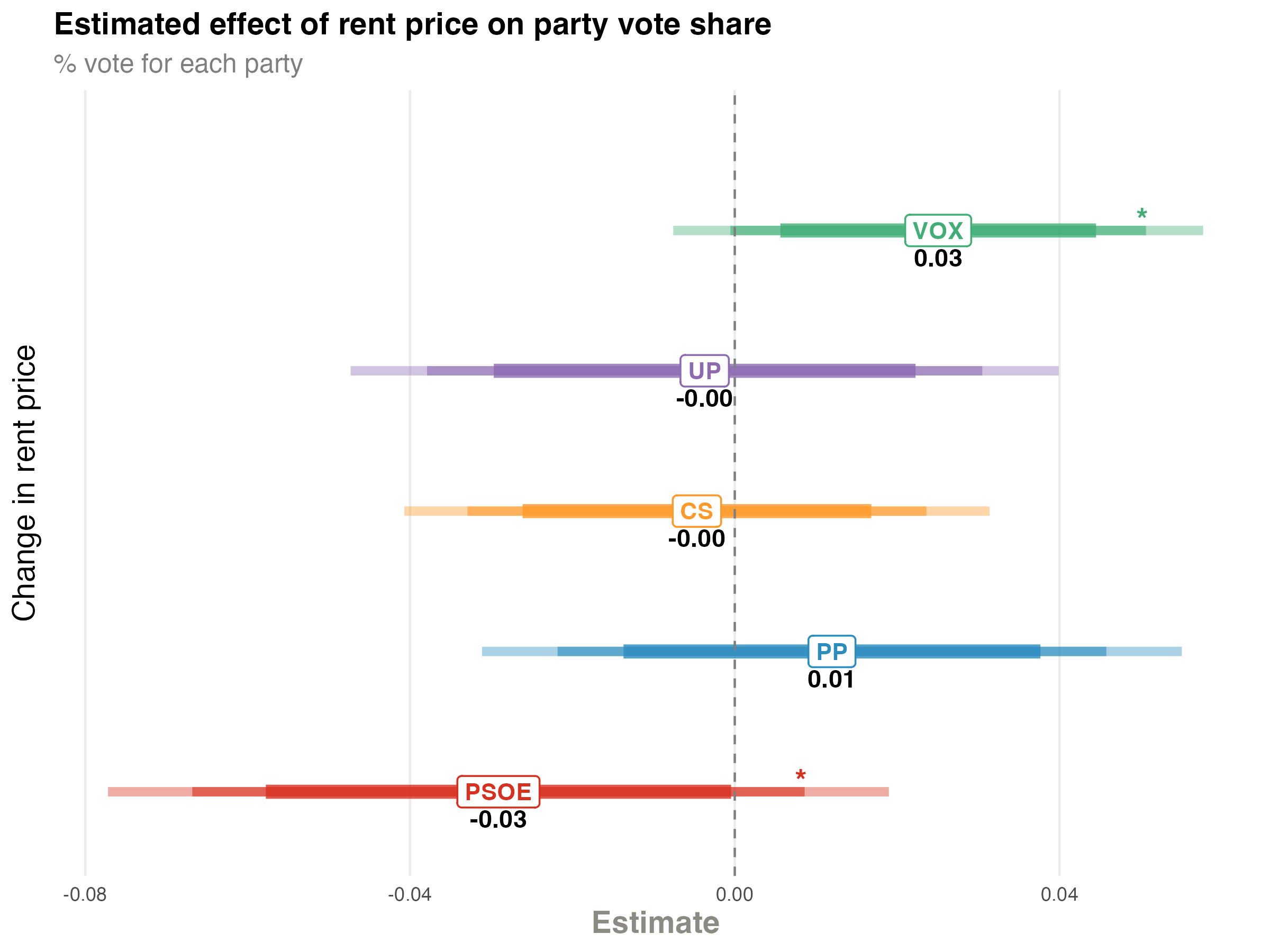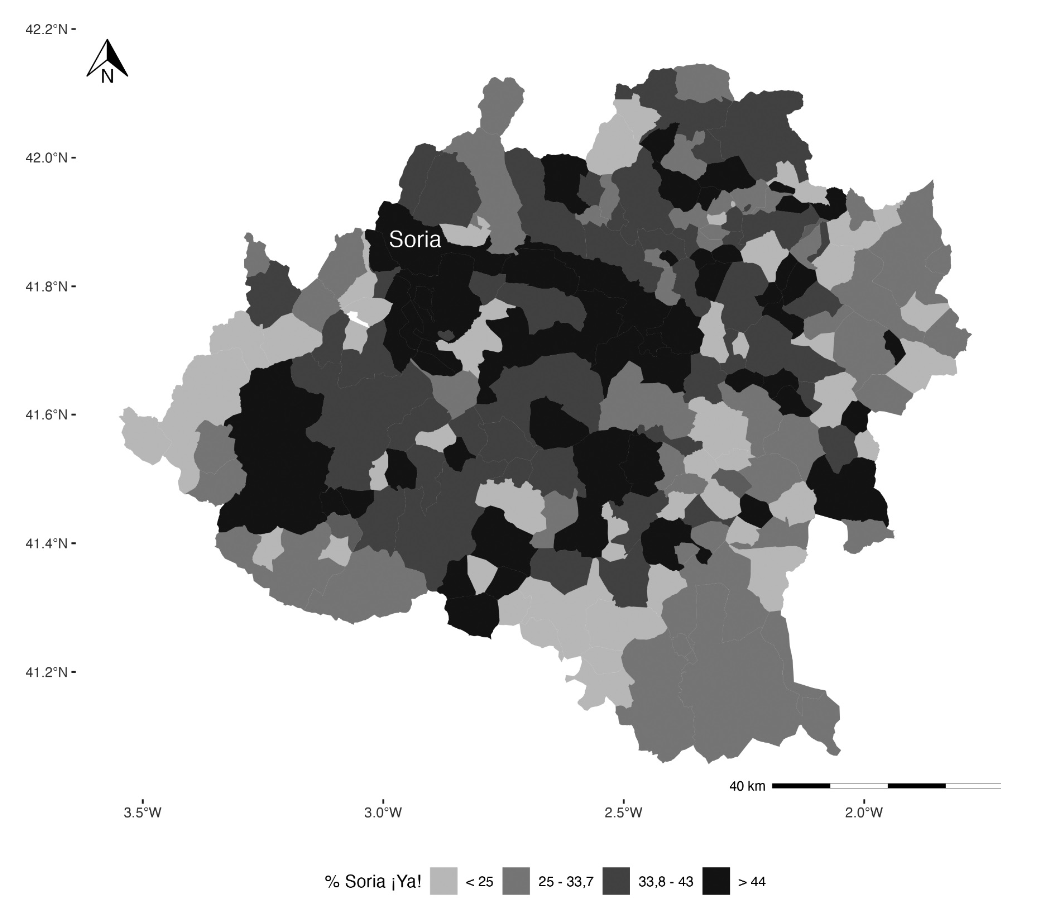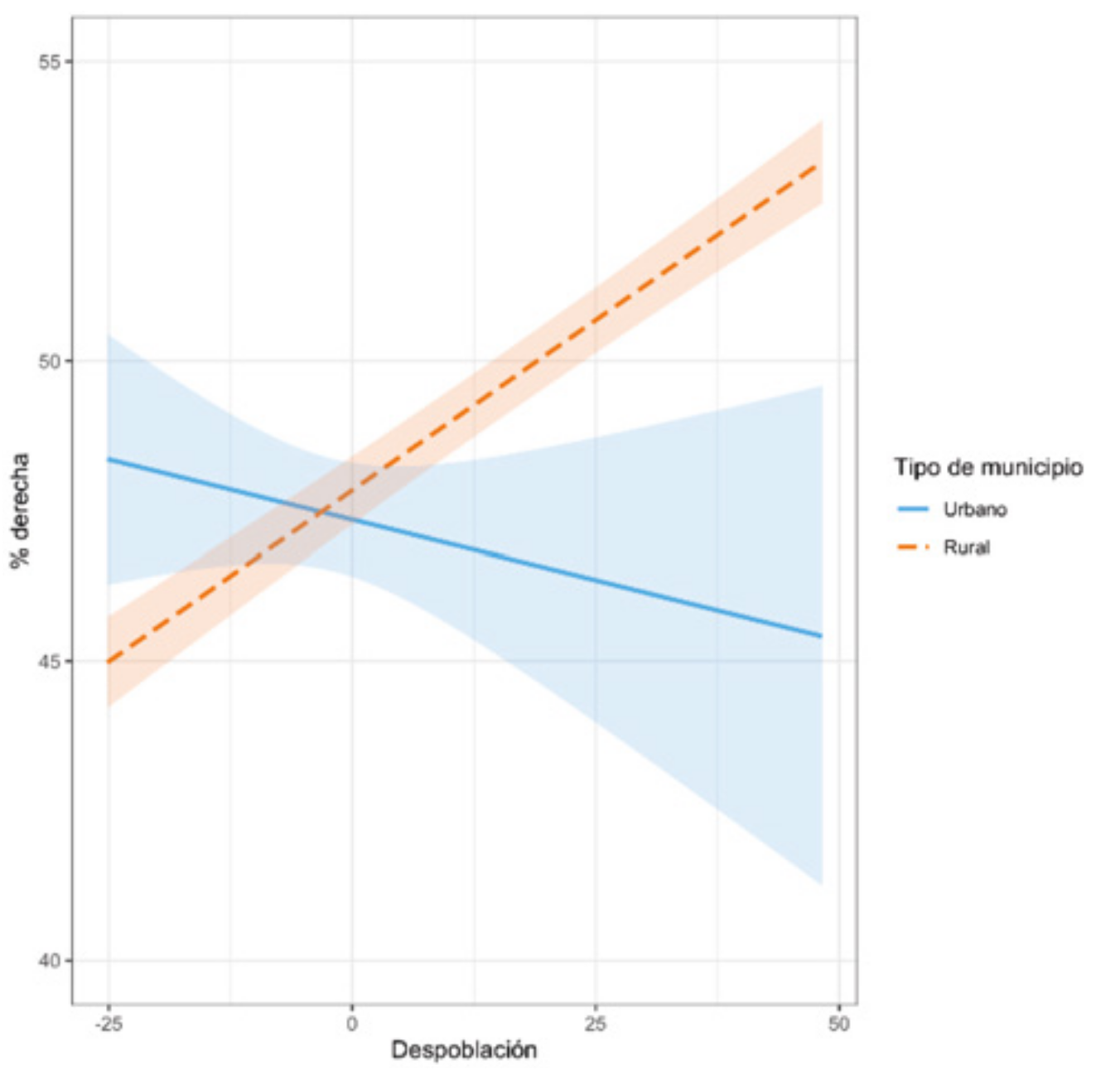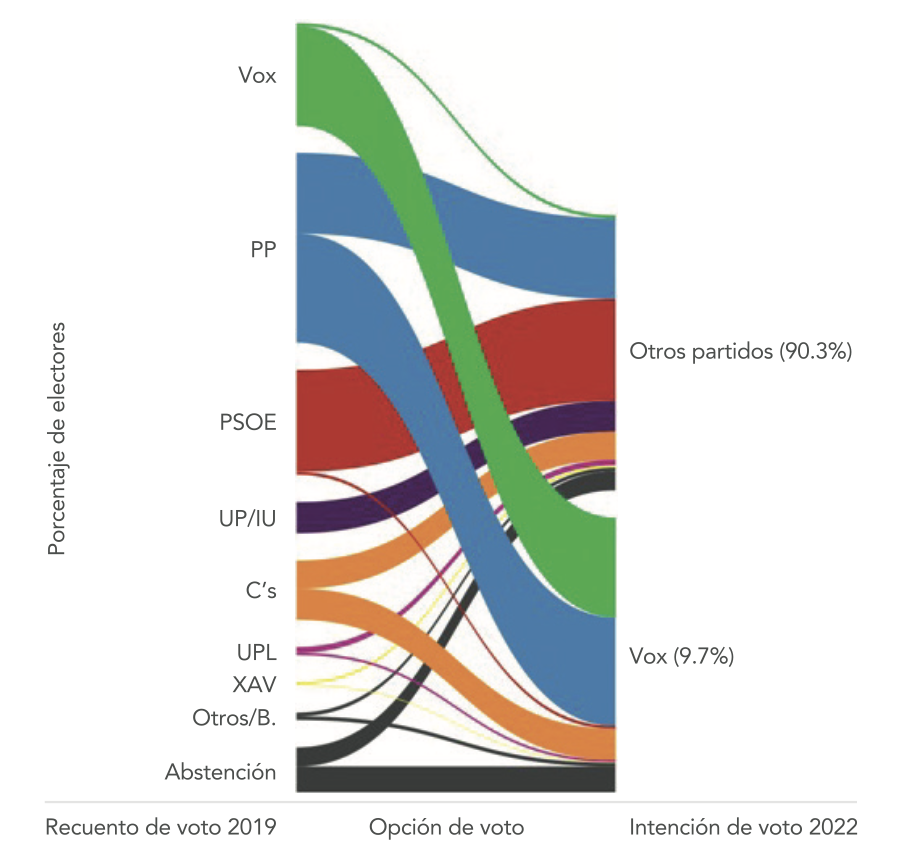publications
Here you can find all my articles from peer-reviewed journals
“If I have seen further than others, it is by standing on the shoulders of giants” - Isaac Newton
2026
-
 Burdens and gains. The association between house rent increases and voting in the city of MadridÁlvaro Sánchez-García, and Hugo Marcos-MarneElectoral Studies, 2026
Burdens and gains. The association between house rent increases and voting in the city of MadridÁlvaro Sánchez-García, and Hugo Marcos-MarneElectoral Studies, 2026Existing research indicates that the electoral effects of changing house rents depend on political parties’ left-right positioning and adherence to populist ideas. This paper explores the association between house rent increases and voting in Madrid by exploiting the availability of fine-grained data at the census tract-level, and the existence of an electoral arena where parties compete from different positions on crucial dimensions such as populism and the intervention of the state in the economy. In particular, we focus our analysis on non-populist parties of the main stream left (PSOE) and right (Ciudadanos and PP), a radical right party with a strong neoliberal discourse and inconsistent populist appeals (VOX), and a radical left party that has traditionally adopted a populist discourse (Unidas Podemos). Our main results indicate that house rent increases benefit right-wing parties in neighbour hoods with high ownership rates (economic gain), thus offering an alternative context-dependent mechanism to explain the success of (liberal) radical right parties when house rents rise. They also suggest that house rent in creases associate with voting for left-wing parties, especially if they adhere to populist ideas, in neighbourhoods with lower levels of homeownership (economic burden).
@article{sanchezgarcia_rents_2026, title = {Burdens and gains. {The} association between house rent increases and voting in the city of {Madrid}}, author = {S{\'a}nchez-Garc{\'i}a, {\'A}lvaro and Marcos-Marne, Hugo}, journal = {Electoral Studies}, doi = {10.1016/j.electstud.2025.103024}, pages = {1-11}, year = {2026}, }
2025
-
 Urban jungle, radical roar: sprawl, economic decline and the success of populist radical right in metropolitan SpainÁlvaro Sánchez-García, and Iván LlamazaresContemporary Politics, 2025
Urban jungle, radical roar: sprawl, economic decline and the success of populist radical right in metropolitan SpainÁlvaro Sánchez-García, and Iván LlamazaresContemporary Politics, 2025In recent years, Populist Radical Right Parties (PRRPs) have gained significant ground in many Western democracies. While most studies focus on rural areas, this paper examines the role of population growth in explaining support for Vox, Spain’s leading PRRP, in urban areas. Spain o)ers a unique case due to its rapid urbanisation and the substantial presence of Vox in metropolitan settings. Using data from over 27,000 urban census tracts, we find that population growth is positively associated with Vox support, particularly in suburban areas. This e)ect is moderated by socio-economic conditions: it is stronger in neighbourhoods with lower incomes and higher unemployment. Our findings suggest that population growth intensifies support for Vox in left-behind urban areas, underlining the interaction between demographic change and socio-economic disadvantage. These results expand the current understanding of PRRP support by showing that both rural depopulation and urban growth contribute to their success. However, the study’s limitations call for further research across di)erent contexts and with more fine-grained indicators of left-behindness.
@article{sanchezgarcia_urban_2025, title = {Urban jungle, radical roar: sprawl, economic decline and the success of populist radical right in metropolitan {Spain}}, author = {S{\'a}nchez-Garc{\'i}a, {\'A}lvaro and Llamazares, Iv{\'a}n}, journal = {Contemporary Politics}, doi = {10.1080/13569775.2025.2573484}, pages = {1-19}, year = {2025}, } -
 Where has everyone gone? Depopulation and voting behaviour in SpainÁlvaro Sánchez-García, Toni Rodon, and Maria Delgado-GarcíaEuropean Journal of Political Research, 2025
Where has everyone gone? Depopulation and voting behaviour in SpainÁlvaro Sánchez-García, Toni Rodon, and Maria Delgado-GarcíaEuropean Journal of Political Research, 2025In many European countries, people increasingly leave rural or small municipalities to live and work in urban or metropolitan environments. Although previous work on the ?left behind? places has examined the relationship between the rural?urban divide and vote choice, less is known about how depopulation affects electoral behaviour. Is there a relationship between experiencing a loss in population and support for the different parties? We investigate this question by examining the Spanish case, a country where the topic of depopulation has become a salient issue in political competition. Using a newly compiled dataset, we also explore whether the relationship between depopulation and electoral returns is moderated by municipality size, local compositional changes, the loss of public services and changes in amenities. Our findings show that depopulated municipalities give higher support to the main Conservative party, mainly in small municipalities. Yet, municipalities on the brink of disappearance are more likely to give larger support to the far-right. Results overall show that the effect of depopulation seems to be driven by compositional changes, and not as a result of losing public services or a deterioration of the vibrancy of the town. Our findings have important implications for our understanding of the relationship between internal migration and electoral behaviour.
@article{sanchezwhere_2024, title = {Where has everyone gone? Depopulation and voting behaviour in Spain}, author = {S{\'a}nchez-Garc{\'i}a, {\'A}lvaro and Rodon, Toni and Delgado-Garc{\'i}a, Maria}, journal = {European Journal of Political Research}, doi = {10.1111/1475-6765.12702}, pages = {296-319}, volume = {64}, number = {1}, year = {2025}, }
2024
-
 ¡Aquí no hay quien viva! El Éxito electoral de las Candidaturas de la España VaciadaÁlvaro Sánchez-García, and Maria Delgado-GarcíaPapeles del CEIC, 2024
¡Aquí no hay quien viva! El Éxito electoral de las Candidaturas de la España VaciadaÁlvaro Sánchez-García, and Maria Delgado-GarcíaPapeles del CEIC, 2024The present article approaches, from an electoralist point of view, an issue in full swing: the emptied Spain. We took Teruel Existe! and Soria Ya! as a case selection, being these the only candidacies of the Plataforma de la España Vaciada (Emptied Spain Platform) that have achieved parliamentary representation. Adopting an exploratory perspective, we try to find out what were the factors at the municipal level that influenced the success of the Candidatures of Empty Spain (CEV). To address this question, we adopted a combined methodology. First, we performed a cluster analysis that allows us to classify the municipalities according to their nature. Secondly, using a linear regression model we explore which of these characteristics influenced the electoral performance of the CEVs. The results show that the success of these formations is found in municipalities close to provincial capitals, with a larger than average size and with a reduced presence of unemployed. However, the factor that shows to have the greatest weight in all the work was the holding of political events at the time of the electoral campaign.
@article{sanchezaqui2024, title = {¡Aqu{\'i} no hay quien viva! {El} {\'E}xito electoral de las Candidaturas de la España Vaciada}, author = {S{\'a}nchez-Garc{\'i}a, {\'A}lvaro and Delgado-Garc{\'i}a, Maria}, journal = {Papeles del CEIC}, doi = {10.1387/pceic.24103}, year = {2024}, }
2023
-
 Different sides, same story. Common factors that contributed to the success of the populist radical parties in SpainÁlvaro Sánchez-García, and Imanol NegralJournal of Contemporary European Studies, 2023
Different sides, same story. Common factors that contributed to the success of the populist radical parties in SpainÁlvaro Sánchez-García, and Imanol NegralJournal of Contemporary European Studies, 2023Voting for Populist Radical Parties (PRPs) in Europe has been a frequent subject of study in recent decades. However, little research has analysed the common factors between ideologically opposed PRPs. In this article we fill this gap in the literature from an ecological perspective at the municipal level. Using the cases of Podemos and Vox in Spain, we analyse whether the same characteristics at the municipal level explain the electoral perfor mance of both parties. To address this question we use the results of the four general elections in which both parties have run. The results confirm an archetype of municipal-level characteristics that explain the success of both PRPs in Spain. These parties had more support in (sub-)urban contexts; with high levels of political disaffection and high incomes. Furthermore, we compare these findings with the pre-existing literature for their European peers and test the peculiarity of the Spanish case.
@article{sanchezdifferent2023, title = {Different sides, same story. Common factors that contributed to the success of the populist radical parties in {Spain}}, author = {S{\'a}nchez-Garc{\'i}a, {\'A}lvaro and Negral, Imanol}, journal = {Journal of Contemporary European Studies}, doi = {10.1080/14782804.2023.2230158}, pages = {228–245}, volume = {32}, number = {1}, year = {2023}, } -
 A río revuelto, ganancia de conservadores: Un análisis de la despoblación y el comportamiento electoral en la España vacíaÁlvaro Sánchez-García, and Toni RodonRevista de Estudios Políticos, 2023
A río revuelto, ganancia de conservadores: Un análisis de la despoblación y el comportamiento electoral en la España vacíaÁlvaro Sánchez-García, and Toni RodonRevista de Estudios Políticos, 2023Over the last years, political parties have increased their efforts to garner electoral support in the so-called ‘empty Spain’. A part of Spain, where recent depopulation dynamics have been intense, allocates 79 parliamentary seats in the Spanish Congress of Deputies and it has emerged as an important electoral asset. Yet, what is the relationship between depopulation and political behaviour? Has the decrease in population benefited or damaged certain parties? As a result of it, has electoral participation increased or decreased? Using a new dataset that includes the share of the votes of different parties and the depopulation dynamics between 2008 and 2019, this article aims at contributing to the existing literature by analysing a phenomenon which we still know little about. To do so, we use the five regions that, according to Sergio del Molino (2016), make up Empty Spain. The analyses indicate that depopulation is related to a significant increase of mobilization and vote for the conservative parties, an effect that is fundamentally driven by demographic compositional changes triggered by young people, who are more likely to be left-wing, but also more likely to move out to urban areas.
@article{sanchezrio2023, title = {A río revuelto, ganancia de conservadores: Un análisis de la despoblación y el comportamiento electoral en la España vacía}, author = {S{\'a}nchez-Garc{\'i}a, {\'A}lvaro and Rodon, Toni}, journal = {Revista de Estudios Pol{\'i}ticos}, doi = {10.18042/cepc/rep.199.07}, pages = {197-224}, number = {199}, year = {2023}, }
2022
-
 La semilla de Vox, ¿quién votó a la derecha radical populista en Castilla y León?Imanol Negral, and Álvaro Sánchez-GarcíaRevista SOCYL, 2022
La semilla de Vox, ¿quién votó a la derecha radical populista en Castilla y León?Imanol Negral, and Álvaro Sánchez-GarcíaRevista SOCYL, 2022This paper presents the results of a case study based on empirical evidence on political demand factors that allow us to analyze the political-electoral success of Vox in Castilla y León. We develop a multilevel logistic regression analysis using data from the CIS pre-electoral survey on the 2022 regional elections in the region. The results show that the characteristics of the Vox electorate in Castilla y León do not fully match those of Vox in the Spanish scenario, nor those of the European Populist Radical Right. Finally, we discovered that Vox’s moment of political and electoral apogee is explained by the fact that the formation draws on a very transversal and volatile electorate. Vox has been able to attract voters with two specificities. First, unlike its European peers, it has managed to mobilize the region’s economic elite. Second, it has attracted voters critical of the current situation in Castilla y León and disaffected withthe management of the Junta’s goverment.
@article{negralsemilla2022, title = {La semilla de Vox, ¿qui{\'e}n vot{\'o} a la derecha radical populista en Castilla y Le{\'o}n?}, author = {Negral, Imanol and S{\'a}nchez-Garc{\'i}a, {\'A}lvaro}, journal = {Revista SOCYL}, doi = {10.48225/ SOCYL202202}, pages = {16--37}, number = {2}, year = {2022}, }